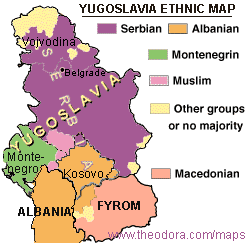The Kosovo Crisis
Author and Page information
- This page: https://www.globalissues.org/article/126/the-kosovo-crisis.
- To print all information (e.g. expanded side notes, shows alternative links), use the print version:
While NATO tried to quickly enforce peace in Kosovo, the way that NATO carried out its actions received harsh criticisms as well. Just because Milosevic's regime was clearly in grotesque violation of many international laws did not automatically justify any reaction without close examination and analysis.
"To use an analogy suggested by Gar Lipow, if a terrorist is holding people hostage in the living room of a house and the police charge in wildly, they will be putting those hostages at risk. Even more reckless would to charge into another room of the house (because it's safer: there's no terrorist there) and start destroying things of value to the terrorist. Such a strategy would seem ideally designed to put the hostages in the greatest possible danger. No one concerned about the well-being of the hostages would behave in this way, but it is exactly the strategy followed by NATO"

Poor Media Representation
Once again, it seems as though the media coverage of the conflict was one-sided and ignored or partially covered many important aspects of the crisis. The propaganda and gross violations of basic rights by the Milosevic regime is well-documented and generally agreed with. However, the mainstream media were not very objective at the actual way in which NATO carried out their actions. Find out more about the media representation during the Kosovo crisis.
A Humanitarian Conflict?
The Milosevic regime inexcusably cracked down on the Muslim Kosovars and KLA. The indictments for war crimes against Milosevic and members of his regime was right on, as they inflicted terrible atrocities on the Kosovars. Yet, again, the mainstream media ignored some of NATO's own violations of international humanitarian law. Also, the double standards of the humanitarian claim was not looked into. Find out more about the humanitarian claims and aspects of the Kosovo crisis.
Both Sides Violated International Law
International law was blatantly violated as NATO started the bombing campaign while the majority of the mainstream did not provide much objective coverage. NATO's own mandate says that it falls under jusridiction of the UN, but instead it was totally by-passed. Even the US Congress had not approved war. Find out more about the role of international law during the Kosovo crisis.
Massive Bombing Campaign
According to Noam Chomsky, "On March 27, NATO Commanding General Wesley Clark declared that it was "entirely predictable" that Serbian terror and violence would intensify after the NATO bombing." And yet, we did not see NATO forces really doing that much to protect fleeing refugees in Kosovo, as they were busy bombing Serbia. Find out more about the effects of NATO bombing during the Kosovo crisis.
Environmental Concerns
Illegal depleted Uranium was used, just as it was in the Gulf War in 1991. Many civilian facilities were bombed by NATO while claiming that this was acceptable because these facilities were used by the military. As well as bridges, schools and media stations, oil refineries and other chemical factories, were amongst the major NATO targets, causing environmental concerns for the region, as well as violating international law. Find out more about the effects on the environment resulting from the bombing.
Hasty Decision
With the 50th anniversary of NATO during this crisis, and the question of its need, maintaining the credibility of NATO was also claimed by officials as a reason for using NATO. The Balkans is a politically unstable region with many factors influencing interests there. Find out more about the effects of hasty decisions during the Kosovo crisis.
Political Factors
The crisis has affected relations with Russia as well as having other long term impacts on the political stability in the region. Numerous additional political reasons could help explain other motives and interests in the area too. Find out more about the possible political factors.
What is Happening Now?
As the bombing ended and "peace" was negotiated, it emerged that all sides had lost more than what even the original Rambouillet demands mentioned (and that itself was not exactly the fairest of accords). There are now many issues needing attention to, in order to help rebuild the area. Such issues include the relief for the returning refugees, the attacks against Serbs and other ethnic minorities in Kosovo as returning Kosovars vent their anger at what the Serb troops had done, the democratic processes and demonstrations against Milosevic in Serbia, subsequent elections that ousted him from power, the future of the KLA and the debate about autonomy or independence for Kosovo, as well as other issues of stability in the region. Find out more more about the rebuilding of Kosovo and the future of this area.
Author and Page Information
- Created:
- Last updated:
 Global Issues
Global Issues